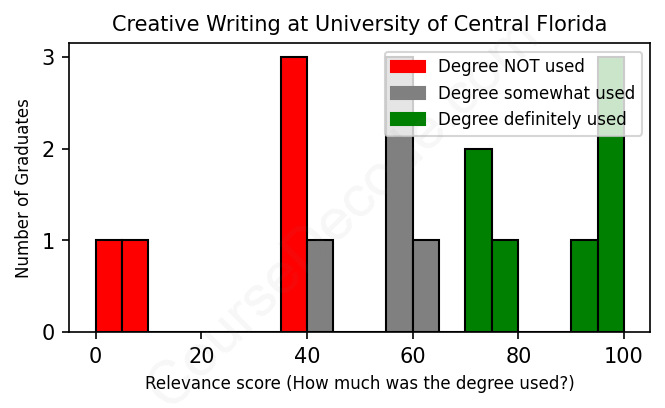
First, some facts. Of the Creative Writing graduates from University of Central Florida we've analyzed , here's how many have used (or NOT used) their degree in their career:

These are estimates based on AI analysis of 17 LinkedIn profiles (see below).
The verdict? Below average. Overall, with an average relevance score of 58%, Creative Writing graduates from University of Central Florida have a lower likelihood (-9%) of finding work in this field compared to the average graduate across all fields:
And for comparison, here's the chart for all profiles we've looked at across all degrees.
Also, after graduating, 47% of these graduates have pursued further education other than another Bachelor's degree (such as a Masters degree or other), compared to the average across all profiles of 35%. This suggests you may need more than just a Bachelors degree to be competitive as a Creative Writing graduate.
See the details:
|
Relevance score: 43% We think this person has gone into a career only somewhat relevant to their degree. We think this person has gone into a career only somewhat relevant to their degree.
DEGREE INFOGraduated in 2012 from University of Central Florida with a Bachelor of Arts in Creative Writing. Also pursued further education since (see below). JOB HISTORY SINCE GRADUATIONEditor Internship at Cypress Dome Magazine University of Central Florida Jan 2012 - Apr 2012 Cashier  Einstein Bros Bagels Aug 2012 - Jun 2014 CCD Teacher  Mother of Divine Providence Catholic Church Aug 2014 - May 2015 Hispanic Ministry Intern  Villanova University - Latino Ministry Aug 2015 - May 2016 Theology Teacher  Melbourne Central Catholic High School Aug 2016 - Jan 2022 Director of Faith Formation  The Basilica of St. Peter Feb 2022 - Present FURTHER DEGREES DONE SINCE GRADUATINGMasters of Theology - Pastoral Ministry CertificationVillanova University 2014 - 2016 ABOUTNo information provided. |
The top 10 most common jobs done by the graduates we've analyzed (ranked most common to least) are:
When looking at the career paths of individuals who graduated with a Creative Writing degree from the University of Central Florida, there's quite a mix. A lot of these grads have found themselves in teaching roles, particularly as English or language arts teachers. These positions definitely relate back to their writing expertise since they require the teaching of literature and writing skills to students. There are also some noteworthy roles like Freelance Writer, UX Designer, and Narrative Designer, which directly tap into their creative writing skills. These jobs allow them to use their storytelling abilities and engage with various audiences in meaningful ways.
However, many of the careers listed are less relevant to Creative Writing. A significant number of graduates have taken on roles in customer service, administration, and other fields where writing and creative skills aren't the focus. Jobs like being a cashier or an insurance sales agent tend to emphasize skills unrelated to creative writing. So, while there are some graduates making great use of their Creative Writing education, it seems that not all paths have been directly aligned with their studies, highlighting that a degree in Creative Writing opens doors to diverse career options, but not all of them maintain a strong connection to the craft of writing itself.
Here is a visual representation of the most common words in job titles for Creative Writing graduates (this is across all Creative Writing graduates we've analyzed, not just those who went to University of Central Florida):

When looking at the career trajectories of Creative Writing graduates from the University of Central Florida, it's clear that their paths can be quite varied. Many of these grads seem to kick off their careers in teaching roles, whether as English teachers or in other educational capacities. This makes sense since they have a solid foundation in writing and communication. A few have also landed roles in editing, content creation, or writing, which align nicely with their degree. For instance, we see some jumping into roles as narrative designers and freelance writers, indicating a strong connection to creative media and storytelling.
As we look 5 to 10 years down the line, though, the picture starts to change a bit. While some have persisted in jobs related to their degree, like narrative designing or teaching, others have shifted into more unexpected roles that don't scream 'writer.' There are graduates working as administrative professionals, insurance representatives, or in customer service. It appears that although many started in jobs that could utilize their creative background, some have drifted into different fields, which might suggest that the job market can be pretty competitive and not always aligned with creative writing. Overall, while there's a mix of successful careers directly related to their studies, a notable number of graduates seem to be navigating a more complicated career landscape, often taking on roles that stray far from the world of writing. So, it's a mixed bag really—some are thriving in their creative fields, while others are making it work in areas that don’t fully leverage their writing skills.
Honestly, a Bachelor’s degree in Creative Writing, whether at the University of Central Florida or elsewhere, tends to be on the easier side compared to more technical degrees, but that doesn’t mean it’s a walk in the park. You’ll spend a lot of time writing, reading, and giving and receiving feedback on your work, which can be super rewarding but also tough, especially if you’re putting your heart into your stories and poetry. It requires a lot of creativity, dedication, and self-discipline since you're often figuring out your own style and voice. Plus, balancing creative projects with coursework can be a challenge, so it’s definitely not just about sitting back and letting the words flow. Overall, if you love writing and are willing to put in the effort, it's a pretty fulfilling journey!
Most commonly, in the LinkedIn profiles we've looked at, it takes people 2 years to finish a Bachelor degree in Creative Writing.
So, looking at the job paths of these UCF Creative Writing grads, it kind of seems like they’ve got mixed results when it comes to making decent money. A couple of them landed solid gigs in mental health and narrative design that probably pay fairly well, especially over time, but many others have done a lot of teaching or freelance work, which can be hit or miss financially. Teaching jobs can vary based on location and experience, and freelance work often comes with no steady income, which can make things complicated financially. Plus, there are quite a few with jobs that might not pay much more than minimum wage, like cashiering and entry-level positions. So, overall, it looks like some are doing alright, but others might be struggling a bit more to make those dollar bills!
Here is a visual representation of the most common words seen in the "about" section of LinkedIn profiles who have a Bachelor degree in Creative Writing (this is across all Creative Writing graduates we've analyzed, not just those who went to University of Central Florida). This may or may not be useful:

Here are all colleges offering a Bachelor degree in Creative Writing (ordered by the average relevance score of their Creative Writing graduates, best to worst) where we have analyzed at least 10 of their graduates:
| College | Score | Count |
|---|---|---|
 University of Central Florida University of Central Florida
|
58 | 17 |
 Florida State University Florida State University
|
56 | 15 |
 Columbia College Chicago Columbia College Chicago
|
54 | 10 |
 University of Washington University of Washington
|
53 | 11 |
 University of California, Riverside University of California, Riverside
|
45 | 10 |
 Southern New Hampshire University Southern New Hampshire University
|
44 | 26 |
 Western Washington University Western Washington University
|
44 | 10 |
 Full Sail University Full Sail University
|
21 | 31 |